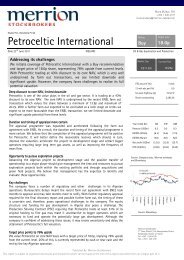Quarterly Bulletin Q3 2013
Quarterly Bulletin Q3 2013
Quarterly Bulletin Q3 2013
Create successful ePaper yourself
Turn your PDF publications into a flip-book with our unique Google optimized e-Paper software.
53<br />
Developments in the International<br />
and Euro Area Economy<br />
Overview<br />
Accommodative policies continue to support growth in the global economy<br />
which has been slower than anticipated, fragile and diverse across economic<br />
regions. Emerging economies are continuing to underpin the improvement in<br />
global economic conditions with activity in the US and Japan also gathering<br />
pace. Total debt levels in these key advanced economies remain elevated<br />
despite progress in the rebalancing of private sector indebtedness. On<br />
the other hand, activity has remained hesitant in the euro area, with some<br />
Member States continuing to record a contraction in activity and very high<br />
unemployment rates. Survey indicators have been signalling a stabilisation in<br />
business sentiment and risk perception. Chinese data warrant monitoring for<br />
downside risks to growth, especially given the strong contribution of Chinese<br />
investment to global GDP. Following a period of sustained improvement, global<br />
financial market conditions have weakened somewhat. Euro area inflation<br />
rates have drifted downwards and remain low while inflation expectations are<br />
generally well-anchored.<br />
The global economy is moving forward, but<br />
divergence between regions and countries<br />
reflects the uneven progress made towards a<br />
recovery from the economic crisis. Latest data<br />
suggest that global trade momentum<br />
moderated during the first quarter of <strong>2013</strong>,<br />
followed by some pick up in April, with<br />
advanced economies in particular contributing<br />
to the weaker-than-expected dynamics.<br />
Despite a strengthening of Chinese import<br />
growth in the first quarter of <strong>2013</strong>, elsewhere,<br />
a more general deceleration in import growth<br />
cut across both high-income and emerging<br />
regions. In the near term, weak confidence<br />
and high uncertainty, particularly in Europe, are<br />
likely to remain significant headwinds to global<br />
growth and the demand for durable and<br />
investment goods – items with high import<br />
content – could restrain the pace of the global<br />
trade recovery. Surveys, in particular an upturn<br />
in new export orders, are indicating an<br />
expansion in global trade, albeit gradual. As<br />
such, global growth indicators continue to<br />
signal moderate growth in the second half of<br />
the year.<br />
Financial market sentiment improved over the<br />
last year principally due to policy actions,<br />
particularly in a number of advanced<br />
economies. Risk perceptions including the<br />
threat of a euro area break-up and a sharp<br />
fiscal contraction in the US associated with the<br />
full fiscal cliff, appear to have diminished.<br />
However, since late May, market sentiment<br />
weakened primarily due to weak economic<br />
data from China and the euro area, as well as<br />
discussions of the possible tapering of the US<br />
Federal Reserve’s asset purchasing<br />
programme. According to the latest OECD<br />
projections, real GDP in the euro area is<br />
expected to decline by 0.6 per cent this year<br />
and rebound only by 1.1 per cent in 2014<br />
(Table 1). In the US, private demand and<br />
growth prospects look to be somewhat<br />
stronger with activity projected to rise by 1.9<br />
per cent this year and close to 3.0 per cent in<br />
2014. Moreover, Japanese real GDP is<br />
expected to grow by between 1.4 and 1.6 per<br />
cent both this year and next.<br />
Downside risks to the advanced economy<br />
growth outlook have reduced, but remain<br />
significant. Adverse interactions between<br />
fragile banking systems, government finances<br />
and the real economy remain a risk in the euro<br />
area. Fiscal concerns will feature in both the




